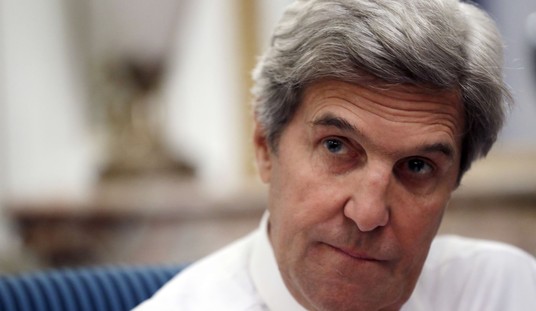It’s romantic to think about global politics as a grand ideological struggle between good and evil — a battle between light and dark. It adds nobility to humanity’s story: We’re not just semi-evolved apes clubbing each other over territorial disputes; we’re heroic gladiators waging war on the side of good!
And sometimes, that’s exactly what it is. World War II was a battle between good and evil. Same for the Cold War (the anguished cries of Bernie Sanders and/or The Washington Post notwithstanding).
But other times, we’re more like semi-evolved apes.
For most of the last 100 years, our wars have been moral crusades. We fought World War I to make the world “safe for democracy.” We fought World War II to rid the world of Nazism. We battled the godless, totalitarian Soviets during the Cold War. And then, following 9/11, we waged a brutal conflict in Iraq to (at least in part) depose Saddam Hussein and bring peace/freedom/McDonald’s to the Middle East.
The first George W. Bush term was the height of the Neocon Era.
Today, the Neocons are (mostly) excised from the GOP. Their philosophy is widely seen as discredited: When we invaded Iraq, our soldiers weren’t “greeted with candy” but targeted for assassinations. It was a painful, bloody — and very expensive — misadventure in the desert.
Perhaps in a different timeline, everything could’ve been different. Maybe, if John McCain were president during the Arab Spring instead of Barack Obama, democracy truly would’ve sprung from a groundswell of popular support in the Arab Street.
It’s possible.
But like Coach Bill Parcells used to say, “You are what your record says you are.” The Iraq War didn’t produce the kind of results to offset its draconian costs, and its failures have discredited the Neocon movement for at least a generation.
Donald Trump and today’s MAGA movement are a throwback to the old era of international affairs. Otto von Bismarck called it “Realpolitik.” It doesn’t view geopolitics as a noble moral crusade but as a pragmatic competition between nations.
Instead of idealism, it calls for realism.
In Realpolitik, the only litmus test is the actual outcome. Intentions, ideals, and moral aspirations are all fine and good, but in Realpolitik, the bottom line is the bottom line: Either it worked or it didn’t.
It’s how the Iranians see the world, too.
The Persian culture is ridiculously ancient. “Humans” have been living on the Iranian plateau for at least 100,000 years. Great empires have blossomed from the region, swelled in size, and subjugated their neighbors for centuries. But other empires have also invaded them, conquered them, and slaughtered their citizens. Sometimes you rise; sometimes you fall.
Everything’s cyclical.
For Americans, history is a tale of triumph: how an innocuous, backwoods collection of freedom-loving colonists could rise to the preeminent global power. We came, we saw, we conquered! Americans view history as a glorious, Godly story of ascent.
Iranians view history much differently.
Given the Iranian perspective, what’s their next move on the global stage? If you were the Top Mullah on the throne, wearing the biggest turban, what would be your next Realpolitik play?
After all, it’s been an awfully rough year for Iran. Their allies in Hezbollah have been decapitated. Hamas has been shredded. Their houseguests are getting whacked. Their only regional ally, Syria, has just fallen. And their closest Eurasian ally, Russia, has its hands full in Ukraine.
They’re down to the Houthis, Iraqi sympathizers, and a few ragtag bands of militias.
Furthermore, their weapon systems have also been discredited: They launched a zillion missiles at Israel and hit nothing; Israel roared back and blasted them to bits.
On top of it all, the incoming U.S. president isn’t a Democratic doof who’ll pay bribes of billions of dollars. Instead, he’s deadly serious about applying “maximum pressure” on the Iranian Mullahs. At a minimum, you know your petro-dollars will be drying up.
Even before Trump takes office, the Iranian economy is reeling. And it’s only gonna get worse.
That’s bad news for a corrupt, immoral theocracy: broke citizens are far more likely to rebel.
So what’s the most logical Iranian move?
Between now and Jan. 20, the Iranians will likely double down on pursuing an atomic weapon. (After Jan. 20, it’ll be more of a risk-reward proposition — how sneaky can they be and what can they get away with?) Perhaps a cash-strapped nuclear power might make a deal; perhaps Iran is closer to achieving a nuclear breakthrough than we realize.
Gaining a nuclear weapon would allow Iran to project military power throughout the Middle East. (Especially once their terrorist proxy pipeline is rebuilt.) It would discourage foreign nations from meddling in Iranian affairs — or funding and/or instigating internal discontent. And it would be a powerful negotiating tool, not just to stave off an American invasion during the Trump years, but for when the next Democratic doof is elected president:
Hey, we got billions when we were only thinking about building a nuke! Imagine what we could get if we actually had a nuke! Ca-ching!
Otherwise, what’s left?
The world is sleepwalking through a particularly dangerous era.










Join the conversation as a VIP Member